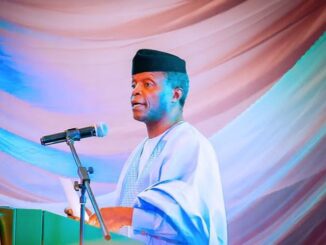
By Gideon Maxwell
January 15, 2025
Former Nigeria’s Vice President, Prof. Yemi Osinbajo, has called for greater debt forgiveness for African countries to enable them to invest in climate-friendly initiatives and foster sustainable development.
Speaking at the 23rd Chief S.L. Edu Memorial Lecture organized by the Nigerian Conservation Foundation (NCF), Osinbajo highlighted the continent’s staggering $824 billion debt burden and projected $74 billion debt servicing obligations by 2024, which severely limit resources for critical climate investments.
Delivering a lecture titled “Greening Africa’s Economies: Can Climate Positive Growth Deliver Prosperity?” Osinbajo emphasised that high borrowing costs have plunged many African nations into unsustainable debt, leaving little fiscal space for green growth.
He proposed a Debt-for-Climate Swap as a solution, where creditors forgive debts in exchange for investments in renewable energy and other climate-positive projects.
This approach, he argued, could help Africa lead a green industrial revolution by harnessing its vast renewable energy potential to reduce emissions, create jobs, and address energy poverty affecting over 600 million people.
ALSO READ: Osinbajo better for Nigeria than Tinubu as president, Buhari didn’t back him — Ojudu
Osinbajo also stressed the need for reforms in the global financial system to lower borrowing costs and improve access to financing for African nations.
He cited technical solutions such as recycling Special Drawing Rights (SDRs), blended financing, and risk mitigation strategies as necessary tools to address the debt crisis.
Furthermore, he urged African leaders to unite in advocating for these reforms while strengthening local financial institutions and capital markets.
Praising the environmental legacy of Shafi Lawal Edu, founder of the NCF, Osinbajo noted that decisions made today would shape the future of the planet.
He concluded by emphasizing Africa’s potential to lead a green industrial civilization and contribute significantly to global net-zero targets by leveraging its renewable energy resources.




